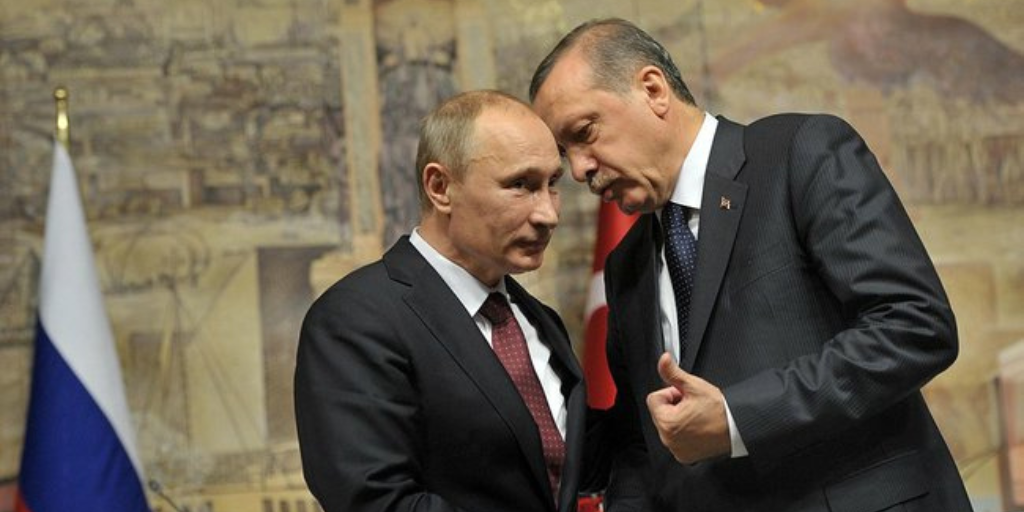Promoted as a means to diversify gas sources, an agreement signed earlier this year by the Bulgarian government to import fossil gas from Turkey is only likely to provide a backdoor for Russian energy and undermine efforts to alleviate Europe’s dependence on fossil fuels
Ventzeslava Kojouharova, National campaigner, Bulgaria | 13 December 2023

Photo source: Kremlin.ru, via Wikimedia commons
Bulgaria used to be heavily dependent on Russian fossil gas. In the beginning of 2022, before the Putin regime’s invasion of Ukraine, Russia supplied around 90% of the gas consumed in Bulgaria. After in April 2022 Bulgaria became one of the first countries to be cut off by Gazprom, the Bulgarian government, led by then Prime Minister Kiril Petkov, took a hard stance against paying for Russian gas in rubbles and announced that other sources of gas will be sought.
In the beginning of 2023, it emerged that the Bulgarian caretaker government had signed a deal with BOTAŞ, Turkey’s state-owned gas monopoly. President Rumen Radev announced the ‘historical agreement’, but no details of the deal were made public. All that was known, was that Bulgaria will have access to Turkey’s gas infrastructure and more importantly, to liquified gas (LNG) terminals – indeed, a first, as Turkey had refused to provide such access so far. In the beginning of the year, when the deal was first announced, the only clear parameters were that Bulgaria will receive 1.5 billion cubic meters (bcm) of gas a year via Turkey, and the gas will be transported via the old Trans-Balkan pipeline particularly through long-term contracts,.
As details about the deal started surfacing in recent months, it became increasingly clear that the deal is benefiting BOTAŞ a lot more than Bulgartransgaz, the Bulgarian gas transmission operator. Bulgarian news outlet Capital published an article outlining these details which they obtained through a leaked private and confidential government document. According to this article, Bulgargaz doesn’t actually get access to the Turkish transmission network, but only the right to unload tankers at a specific terminal and to receive the same amount of gas at its border. At the same time, BOTAŞ is given access to the Bulgarian gas transmission network and can even supply end consumers. The Turkish energy giant will be able to sell gas on the Bulgarian market to third parties without coordination with Bulgargaz, and to deliver to other states without specifying the origin of the gas in question.
Finally, the reserved capacity of the deal is 1.85 bcm rather than the announced 1.5 bcm; considering the low gas consumption in Bulgaria (2.7. bcm), any increase in the gas imports may risk a push towards consuming more. If Bulgarian policymakers are serious about their commitments to transition the country’s energy away from fossil fuels, rather than looking for additional ways to increase gas imports particularly through long-term contracts, the more logical trajectory remains to reduce consumption.
What is of particular importance about this deal though is the elephant in the room – there is no specific mention about where the gas will be coming from.
In December 2022, Russian news agencies circulated that Presidents Vladimir Putin and Recep Tayip Erdogan discussed the possibility to create a ‘regional gas hub’ in Turkey with Russian gas. Russia’s economic interest in this hub is obvious, as at that point – in the end of 2022 and beginning of 2023 when the deal was signed – Russian gas exports to Europe have nearly been eliminated since the beginning of the war in Ukraine. Putin’s Russia has an interest in regaining its strong position in Europe, by using another route – via Turkey. Commenting on the hub, Putin says can it be used as a “regional supply hub for Russian gas exports to European countries” given Europe’s reluctance to buy gas directly from Gazprom.
It is unlikely that all of these factors are a coincidence – the talks between Turkey and Russia to create a ‘hub’ for Russian gas, the ambitions of both countries to dominate the energy sector, the fact that Turkey has never been really open to giving access to its LNG terminals before, the fact that the deal was made by the interim caretaker government – the one that was willing to resume talks with Gazprom in the summer of 2022 in order to have access to cheaper Russian gas.
Even Turkey’s energy minister, Fatih Dönmez, described the deal with Bulgaria as a “stepping stone” in establishing the new hub. While the Bulgarian government stated that Bulgaria will have access to all gas ‘from all global producers’ through this deal, there is hardly any way to know the origin of the gas; it is highly likely that Russian gas would make its way into Bulgaria’s gas grid, considering that around half of the gas Turkey imports is Russian.
In general, this potential turn towards Moscow is inexplicable against the backdrop of the war in Ukraine and the sudden and unlawful disruption of supplies by Russia. The deal with Turkey still carries geopolitical risks as well the risk of working with unreliable partners, which is a concern that should be especially valid with regards to long-term contracts, as this one.
The European Commission itself has concerns about this deal and its transparency and in October 2023 even opened an investigation. Putting aside the question of whether the caretaker government even a right had to make such long-term fossil fuel deals, the more important thing to consider is that long-term contracts with such high economic and political risks are doing more to hinder Bulgaria’s energy security than to promote it.
Never miss an update
We expose the risks of international public finance and bring critical updates from the ground – straight to your inbox.
